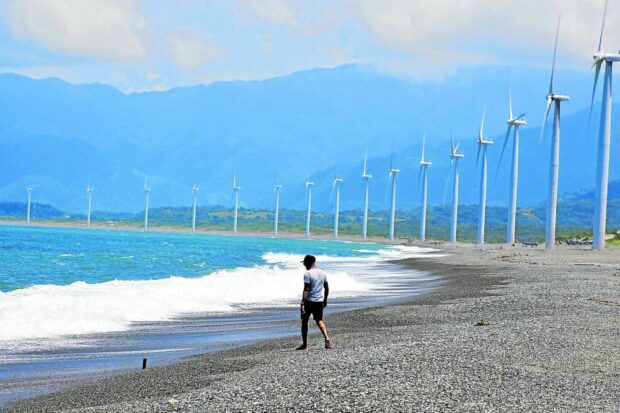
File photo taken in 2019 shows the wind farm in Bangui, Ilocos Norte (WILLIE LOMIBAO)
TOKYO, Japan — President Ferdinand “Bongbong” Marcos Jr. on Friday said that he will invite leaders from the Asia Zero Emission Community (Azec) to invest in the Philippines’ renewable energy sector.
Marcos said that he would update member countries on the Philippines’ efforts towards clean energy transition, touting efforts all the way back from his time as a local government official.
“We will highlight our experience in promoting clean energy projects such as the first wind farms in Southeast Asia in 2003 during my term as governor of Ilocos Norte. I will thus invite Azec Partners, Japan included, to invest in the Philippine Renewable Energy Industry to achieve not only the intention of the Azec, but also the overall goal of the Paris Agreement,” Marcos said before flying to Japan for the 50th Commemorative Asean-Japan Friendship and Cooperation Summit.
Azec is a platform with 11 member countries that have agreed to pursue carbon neutrality, namely Australia, Brunei Darussalam, Cambodia, Indonesia, Japan, Laos, Malaysia, Philippines, Singapore, Thailand, and Vietnam.
On December 14, Environment Secretary Maria Antoniya Yulo-Loyzaga confirmed that the Philippines secured a seat on the board of the Loss and Damage Fund, which is a climate fund dedicated to helping developing countries disproportionately affected by climate change.
Asean sessions
The Azec meeting comes at the heels of the Asean – Japan Friendship and Cooperation.
Marcos said this year’s meeting will focus on Tokyo’s contributions to the organization, people-to-people relations, and economic cooperation.
Marcos told government officials that the Summit will have three sessions.
“The first session will take stock of Japan’s contribution to Asean’s community-building efforts, as well as Japan’s consistent support for Asean Centrality and the rules-based international order,” said Marcos.
“The second session will feature ‘Heart to Hear’ Partnership across Generations. We will recognize Japan’s commitment and steadfast initiatives in promoting friendship and camaraderie amongst the peoples of Asean and Japan to include the Japan-East Asia Network of Exchange for Students and Youths Program.”
Lastly, the last major program of the Summit is the Co-Creation of Economy and Society of the Future.
“I will highlight that the Asean-Japan relationship has inexorably evolved and progressed over the past five decades, particularly in shared commitment towards peace and security, trade and investment, food security, climate action, energy security, supply chain resilience, infrastructure development, and now, connectivity,” Marcos added..
On top of the sessions, a bilateral meeting with Japanese Prime Minister Fumio Kishida may be possible.
“This administration will see to it that our constructive engagements with ASEAN, our External Partners and stakeholders, will continue to best serve our national interest, inasmuch as we promote the regional interest of peace, security, and prosperity, for the well-being of the Filipino people,” said the President.